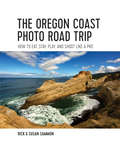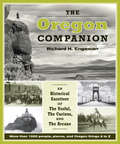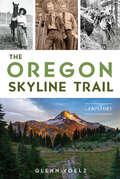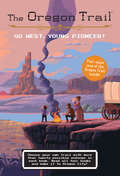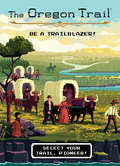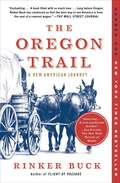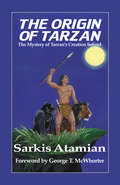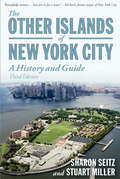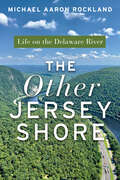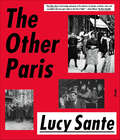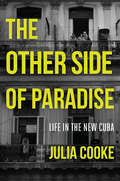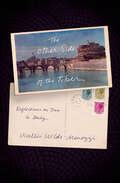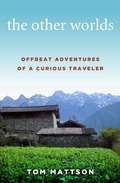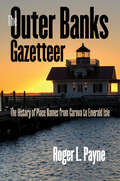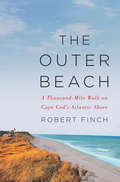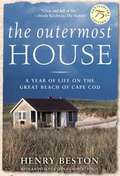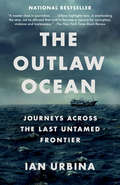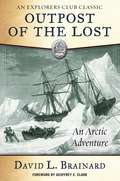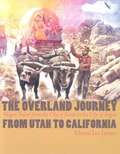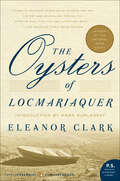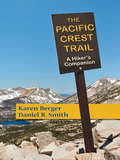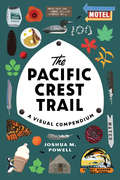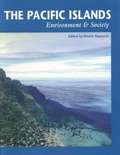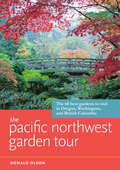- Table View
- List View
The Oregon Coast Photo Road Trip: How To Eat, Stay, Play, And Shoot Like A Pro
by Rick SammonCapture the incredible sights of Oregon’s majestic seaside Rick and Susan Sammon are back to share their seasoned photography and travel wisdom, this time guiding the reader through the remarkable landscapes and cultural treasures of the Oregon Coast, from Cannon Beach to Bandon Beach. Whether toting professional gear or just smartphones, travelers will find practical tips and expert knowledge on taking the best photos of the coast’s shorelines, rock faces, lighthouses, and more. When the journey is over, The Oregon Coast Photo Road Trip offers photo editing advice for everything from industry-leading software to a smartphone’s default camera app, so the memories can be relived and preserved. More than just guides to the practice of photography, Rick and Susan also cover all of the best places to lodge, dine, and shop, providing a detailed and tailored itinerary and map so travelers can make the most of every mile of coast.
The Oregon Companion: An Historical Gazetteer of the Useful, the Curious, and the Arcane
by Richard H. EngemanWhat's the connection between Ken Kesey and Nancy's Yogurt? How about the difference between a hoedad and a webfoot? What became of the Pixie Kitchen and the vanished Lambert Gardens?The Oregon Companion is an A–Z handbook of over 1000 people, places, and things. From Abernethy and beaver money to houseboats, railroads, and the Zigzag River, an intrepid public historian separates fact from fiction — with his sense of humor intact. Entries include towns and cities, counties, rivers, lakes, and mountains; people who have left a mark on Oregon; industries, products, crops, and natural resources. Includes more than 160 historical black and white photos. This entertaining and delightfully meticulous compendium is an essential reference for anyone curious about Oregon.
The Oregon Skyline Trail: A History (The History Press)
by Glenn VoelzThe foundation of America's greatest long-distance hiking trail. The Skyline Trail began as a network of footpaths created by Oregon's indigenous tribes. Early fur traders and explorers followed in their steps, seeking safe routes over the unmapped Cascades. Judge John Breckenridge Waldo later spent decades exploring the mountain trail between Mount Hood and Crater Lake and led the campaign for the area's preservation. During the 1920s, the Forest Service briefly considered turning the path into a scenic highway and sent one of its first recreational specialists, Frederick Cleator, to blaze a prospective route through the mountains before scrapping the ideaJoin author Glenn Voelz as he recounts the fascinating history of Oregon's Skyline Trail.
The Oregon Trail Collection #1-4
by Jesse WileyIn this collection, choose your own trail and complete the journey to Oregon City with all four books in this exciting series! It's 1850 and your first goal is to get your family, covered wagon full of supplies, and oxen to Chimney Rock on time. But hurry—you'll need to make it through the rugged mountains before winter snow hits. Plus, there are wild animals, natural disasters, unpredictable weather, fast-flowing rivers, strangers, and sickness that will be sure to stand between you and your destination! Which path will get you safely across the unforgiving terrain—from Independence, Missouri to Oregon City? With twenty-two possible endings in each book, choose wrong and you'll never make it on time. Choose right and blaze a trail that gets you closer to your final destination—and don't forget to look at your map! The ebook includes: The Race to Chimney Rock, Danger at the Haunted Gate, The Search for Snake River, The Road to Oregon City
The Oregon Trail Trailblazer (The Oregon Trail)
by Jesse WileyThis digital box set includes four Oregon Trail adventures where you choose the path to Oregon City. Featuring 8-bit black-and-white illustrations throughout, each book is its own unique journey West with more than twenty possible endings! The books featured are Wagon Train Trek, Alone in the Wild, Gold Rush!, and Calamity in the Cold. This bindup includes: ·Wagon Train Trek ·Alone in the Wild ·Gold Rush! ·Calamity in the Cold Ford rivers, hike mountains, and trek the Oregon Trail, young pioneer! On your way, you’ll face wild animals, natural disasters, famine, sickness, unpredictable weather, and more. You'll also meet helpful strangers and encounter dishonest people—who will you choose to trust? With more than twenty possible endings in each standalone book, each decision counts. Make the right choices and blaze a trail out west!
The Oregon Trail: A New American Journey
by Rinker Buck#1 NEW YORK TIMES BESTSELLER • #1 Indie Next Pick • Winner of the PEN New England Award “Enchanting…A book filled with so much love…Long before Oregon, Rinker Buck has convinced us that the best way to see America is from the seat of a covered wagon.” —The Wall Street Journal “Amazing…A real nonfiction thriller.” —Ian Frazier, The New York Review of Books “Absorbing…Winning…The many layers in The Oregon Trail are linked by Mr. Buck’s voice, which is alert and unpretentious in a manner that put me in mind of Bill Bryson’s comic tone in A Walk in the Woods.” —Dwight Garner, The New York TimesA major bestseller that has been hailed as a “quintessential American story” (Christian Science Monitor), Rinker Buck’s The Oregon Trail is an epic account of traveling the 2,000-mile length of the Oregon Trail the old-fashioned way—in a covered wagon with a team of mules—that has captivated readers, critics, and booksellers from coast to coast. Simultaneously a majestic journey across the West, a significant work of history, and a moving personal saga, Buck’s chronicle is a “laugh-out-loud masterpiece” (Willamette Week) that “so ensnares the emotions it becomes a tear-jerker at its close” (Star Tribune, Minneapolis) and “will leave you daydreaming and hungry to see this land” (The Boston Globe).
The Origin of Tarzan: The Mystery of Tarzan's Creation Solved
by Alison AtamianToday, Tarzan's universally popular appeal is as great as always. Scholars and fans are still intrigued with the problem of influence on ERB's imagination which created Tarzan. Research continues unabated and, in the opinion of Atamian, and with due respect, still misses the mark. The Origins of Tarzan solves the mystery of Tarzan's creation and reveals the major ideas which inspired Edgar Rice Burroughs to create one of the great hero archetypes of all times.
The Other Islands of New York City: A History and Guide (Third Edition)
by Stuart Miller Sharon Seitz“A well-written and comprehensive tale . . . a lively history of the people and events that forged modern-day New York City.”—The Urban Audubon Experience a seldom-seen New York City with journalists and NYC natives Sharon Seitz and Stuart Miller as they show you the 42 islands in this city’s diverse archipelago. Within the city’s boundaries there are dozens of islands—some famous, like Ellis, some infamous, like Rikers, and others forgotten, like North Brother, where Typhoid Mary spent nearly 30 years in confinement. While the spotlight often falls on the museums, trends, and restaurants of Manhattan, the city’s other islands have vivid and intriguing stories to tell. They offer the day-tripper everything from nature trails to military garrisons. This detailed guide and comprehensive history will give you a sense of how New York City’s politics, population, and landscape have evolved over the last several centuries through the prism of its islands. Full of practical information on how to reach each island, what you’ll see there, and colorful stories, facts, and legends, The Other Islands of New York City is much more than a travel guide.
The Other Jersey Shore: Life on the Delaware River
by Michael Aaron RocklandRiver otters, black bears, and red foxes drink from its clear waters. Prickly pear cacti grow from the red shale cliffs that overlook it, while on the river near Bordentown lies the archeological remnants of a sprawling estate built by the former King of Spain, Napoleon’s brother, who lived there for almost twenty years. You might imagine this magical and majestic waterway is located in some faraway land. But in fact, it’s the backbone and lifeblood of the Garden State: the Delaware River. The Other Jersey Shore takes readers on a personal tour of the New Jersey portion of the Delaware River and its surroundings. You will learn about the role that the river played in human history, including Washington’s four crossings of the Delaware during the Revolutionary War. And you will also learn about the ecological history of the river itself, once one of the most polluted waterways in the country and now one of the cleanest, providing drinking water for 17 million people. Michael Aaron Rockland, a long-time New Jersey resident, shows readers his very favorite spots along the Delaware, including the pristine waterfalls and wilderness in the Delaware Water Gap recreation area. Along the way, he shares engrossing stories and surprising facts about the river that literally defines western New Jersey.
The Other Paris
by Lucy Sante“The Other Paris is both eulogy and paean to the matrixes of anarchy, creativity, crime, and serendipity that once gave shape to the City of Light.” —Anna Wiener, The New RepublicParis, the City of Light, the city of fine dining and seductive couture and intellectual hauteur, was until fairly recently always accompanied by its shadow: the city of the poor, the outcast, the criminal, the eccentric, the willfully nonconforming. In The Other Paris, Lucy Sante gives us a panoramic view of that second metropolis, which has nearly vanished but whose traces are in the bricks and stones of the contemporary city, in the culture of France itself, and, by extension, throughout the world. Drawing on testimony from a great range of witnesses—from Balzac and Hugo to assorted boulevardiers, rabble-rousers, and tramps—Sante, whose thorough research is matched only by the vividness of her narration, takes the reader on a whirlwind tour. Richly illustrated with more than three hundred images, The Other Paris scuttles through the knotted streets of pre-Haussmann Paris, through the improvised accommodations of the original bohemians, through the whorehouses and dance halls and hobo shelters of the old city.A lively survey of labor conditions, prostitution, drinking, crime, and popular entertainment, and of the reporters, réaliste singers, pamphleteers, and poets who chronicled their evolution, The Other Paris is a book meant to upend the story of the French capital, to reclaim the city from the bons vivants and the speculators, and to hold a light to the works and lives of those expunged from its center by the forces of profit.“A wonderfully rich book.” —Allan Massie, The Wall Street Journal
The Other Side of Paradise: Life in the New Cuba
by Julia CookeChange looms in Havana, Cuba's capital, a city electric with uncertainty yet cloaked in cliché, 90 miles from U.S. shores and off-limits to most Americans. Journalist Julia Cooke, who lived there at intervals over a period of five years, discovered a dynamic scene: baby-faced anarchists with Mohawks gelled with laundry soap, whiskey-drinking children of the elite, Santería trainees, pregnant prostitutes, university graduates planning to leave for the first country that will give them a visa.This last generation of Cubans raised under Fidel Castro animate life in a waning era of political stagnation as the rest of the world beckons: waiting out storms at rummy hurricane parties and attending raucous drag cabarets, planning ascendant music careers and black-market business ventures, trying to reconcile the undefined future with the urgent today.Eye-opening and politically prescient, The Other Side of Paradise offers a deep new understanding of a place that has so confounded and intrigued us.
The Other Side of the Tiber: Reflections on Time in Italy
by Wallis Wilde-MenozziA moving and illuminating memoir about a singular woman's relationship with a fascinating and complex countryA fresh, nuanced perspective on a profoundly perplexing country: this is what Wallis Wilde-Menozzi's unique, captivating narrative promises—and delivers.The Other Side of the Tiber brings Italy to life in an entirely new way, treating the peninsula as a series of distinct places, subjects, histories, and geographies bound together by a shared sense of life. A multifaceted image of Italy emerges—in beautiful black-and-white photographs, many taken by Wilde-Menozzi herself—as does a portrait of the author. Wilde-Menozzi, who has written about Italy for nearly forty years, offers unexpected conclusions about one of the most complex and best-loved countries in the world. Beginning her story with a hitchhiking trip to Rome when she was a student in England, she illuminates a passionate, creative, and vocal people who are often confined to stereotypes. Earthquakes and volcanoes; a hundred-year-old man; Siena as a walled city; Keats in Rome; the refugee camp of Manduria; the Slow Food movement; realism in Caravaggio; the concept of good and evil; Mary the Madonna as a subject—from these varied angles, Wilde-Menozzi traces a society skeptical about competition and tolerant of contradiction. Bringing them together in the present, she suggests the compensations of the Italians' long view of time. Like the country, this book will inspire discussion and revisiting.
The Other Worlds: Offbeat Adventures of a Curious Traveler
by Tom Mattson“None of it was meant to be: the stories and anecdotes that appear in this book, my travels to far-flung other worlds, being face-to-face with hundreds of strangers. Yet here we are, and there I’ve been, and somehow, strangers became friends.” From the Introduction Meet Tom Mattson’s friends including Maribel, on a park bench in Havana; Braulio, a silver miner in Bolivia; Chema, a Guatemalan fisherman —- and dozens more around the world. Discover the stories of their lives, their experiences, and their histories, so different from your own. Be charmed by the Minnesota storyteller who draws you into The Other Worlds with ease and who delights in sharing the sights, sounds, smells, and serendipities of his adventures with armchair - and active - travelers everywhere.
The Outer Banks Gazetteer: The History of Place Names from Carova to Emerald Isle
by Roger L. PayneThe rich history of North Carolina's Outer Banks is reflected in the names of its towns, geographic features, and waterways. A book over twenty years in the making, The Outer Banks Gazetteer is a comprehensive reference guide to the region's place names—over 3,000 entries in all. Along the way, Roger L. Payne has cataloged an incredible history of beaches, inlets, towns and communities, islands, rivers, and even sand dunes. There are also many entries for locations that no longer exist—inlets that have disappeared due to erosion or storms, abandoned towns, and Native American villages—which highlight important and nearly forgotten places in North Carolina's history. Going beyond simply recounting the facts behind the names, Payne offers information-packed and entertainingly written stories of North Carolina, its coastal geography, and its people.Perfect for anyone interested in the North Carolina coast, this invaluable reference guide uncovers the history of one of the most-visited areas in the Southeast.
The Outer Beach: A Thousand-mile Walk On Cape Cods Atlantic Shore
by Robert FinchA poignant, candid chronicle of a beloved nature writer’s fifty-year relationship with an iconic American landscape. Those who have encountered Cape Cod—or merely dipped into an account of its rich history—know that it is a singular place. Robert Finch writes of its beaches: “No other place I know sears the heart with such a constant juxtaposition of pleasure and pain, of beauty being born and destroyed in the same moment.” And nowhere within its borders is this truth more vivid and dramatic than along the forty miles of Atlantic coast—what Finch has always known as the Outer Beach. The essays here represent nearly fifty years and a cumulative thousand miles of walking along the storied edge of the Cape’s legendary arm. Finch considers evidence of nature’s fury: shipwrecks, beached whales, towering natural edifices, ferocious seaside blizzards. And he ponders everyday human interactions conducted in its environment with equal curiosity, wit, and insight: taking a weeks-old puppy for his first beach walk; engaging in a nocturnal dance with one of the Cape’s fabled lighthouses; stumbling, unexpectedly, upon nude sunbathers; or even encountering out-of-towners hoping an Uber will fetch them from the other side of a remote dune field. Throughout these essays, Finch pays tribute to the Outer Beach’s impressive literary legacy, meditates on its often-tragic history, and explores the strange, mutable nature of time near the ocean. But lurking behind every experience and observation—both pivotal and quotidian—is the essential question that the beach beckons every one of its pilgrims to confront: How do we accept our brief existence here, caught between overwhelming beauty and merciless indifference? Finch’s affable voice, attentive eye, and stirring prose will be cherished by the Cape’s staunch lifers and erstwhile visitors alike, and strike a resounding chord with anyone who has been left breathless by the majestic, unrelenting beauty of the shore.
The Outermost House: A Year of Life on the Great Beach of Cape Cod
by Henry BestonFirst published in 1928, this is a classic of nature writing based on a year the author spent in a cottage among the dunes near Eastham on Cape Cod. Beston describes waves and tides, birds, fish, and his occasional visitors, and reflects on the relationship between humans and the natural world.
The Outlaw Ocean: Journeys Across the Last Untamed Frontier
by Ian Urbina"A riveting, terrifying, thrilling story of a netherworld that few people know about, and fewer will ever see.... The soul of this book is as wild as the ocean itself."--Susan Casey, best-selling author of The Wave: In Pursuit of the Rogues, Freaks, and Giants of the Ocean <P><P>A riveting, adrenaline-fueled tour of a vast, lawless and rampantly criminal world that few have ever seen: the high seas.There are few remaining frontiers on our planet. But perhaps the wildest, and least understood, are the world's oceans: too big to police, and under no clear international authority, these immense regions of treacherous water play host to rampant criminality and exploitation. <P><P>Traffickers and smugglers, pirates and mercenaries, wreck thieves and repo men, vigilante conservationists and elusive poachers, seabound abortion providers, clandestine oil-dumpers, shackled slaves and cast-adrift stowaways -- drawing on five years of perilous and intrepid reporting, often hundreds of miles from shore, Ian Urbina introduces us to the inhabitants of this hidden world. <P><P>Through their stories of astonishing courage and brutality, survival and tragedy, he uncovers a globe-spanning network of crime and exploitation that emanates from the fishing, oil and shipping industries, and on which the world's economies rely. <P><P>Both a gripping adventure story and a stunning exposé, this unique work of reportage brings fully into view for the first time the disturbing reality of a floating world that connects us all, a place where anyone can do anything because no one is watching. <P><P><b> A New York Times Bestseller </b>
The Outlaws of Ennor (Last Templar Mysteries 16): A devishly plotted medieval mystery
by Michael JecksSeparated, but working on the same mystery, what will befall Sir Baldwin and Simon Puttock after a devastating shipwreck? The brooding Scilly Isles provide the backdrop to Michael Jecks' absorbing sixteenth mystery, The Outlaws of Ennor, featuring the ever-popular Sir Baldwin de Furnshill and Bailiff Simon Puttock. Perfect for fans of Susanna Gregory and C.J. Sansom. 'Tremendously successful medieval mystery series' - Sunday Independent On the return from their pilgrimage to Santiago de Compostela, in the summer of 1323, Sir Baldwin de Furnshill and Bailiff Simon Puttock's ship is attacked by pirates. They fight their attackers off, but then there are too few shipmen when a terrible storm strikes. As the ship breaks up, Simon sees Baldwin washed overboard. Distraught, Simon makes his way to shore.But on the island of Ennor, he must put aside his fears and investigate the murder of Robert, the island's hated tax collector, at the behest of master of the castle, Ranulph de Blancminster.Meanwhile, washed up on the other side of the island, Baldwin begins his own investigation of the same murder. As the friends dig deeper, they become embroiled in a bitter rivalry between the two island communities. Can they uncover the truth in time to prevent certain massacre? What readers are saying about The Outlaws of Ennor: 'Michael's books are full of intrigue and mystery and they are particularly well researched''What a great book this was...Michael Jecks is a great writer and in this genre, I don't think you will find anyone better''Five stars'
The Outpost of the Lost: An Arctic Adventure
by David L. Brainard Geoffrey E. ClarkIn the summer of 1881, Lt. Adolphus Greely of the Fifth United States Cavalry and a crew of twenty-one men set out on the Proteus to explore the then relatively-unknown Arctic Circle. During their three-year journey, the Lady Franklin Bay expedition, as it came to be known, was meant to ascertain new astronomical data, to establish an observation station, and to record other meteorological data. And while they did accomplish those tasks, the crew of the Proteus will instead forever be remembered for the catastrophe that they encountered, one that yielded few survivors. After a relatively calm first year in the Arctic, the members of the Lady Franklin Bay Expedition grew increasingly desperate as ships carrying essential supplies—food, clothing, and building materials, among other items—failed to reach them due to increasingly perilous conditions. Slowly but surely the harsh weather and low supplies decimated the crew, as one by one they succumbed to the merciless Arctic. When a rescue vessel finally reached the Proteus in 1884, only six members of the original expedition remained. Told in concise prose with stunning clarity, Proteus crew member David L. Brainard's Outpost of the Lost is an inspiring account of human spirit and perseverance, and is not be missed by any armchair adventurer or history buff.
The Overland Journey from Utah to California: Wagon Travel from the City of Saints to the City of Angels
by Edward Leo LymanThe wagon trail between Salt Lake City and Los Angeles is one of the most important and least-known elements of nineteenth-century Western migration. Known as the Southern Route, it included the western half of the Old Spanish Trail and was favored because it could be used for travel and freighting year-round. It was, however, arguably the most difficult route that pioneers traveled with any consistency in the entire history of the country, following not rivers but leading from one--sometimes dubious--desert watering place to the next and offering few havens for the sick, weary, or unfortunate. The Southern Route played a major role in the settlement and development of the Southwest, and it became the foundation for later railroads and highways. It was also a locus where several cultures--Native American, Spanish, Anglo-American, and Mormon--confronted each other, sometimes violently, and one of its oases, the artesian springs at Las Vegas, grew into a major urban center. Lyman's account is replete with the,color, adventure, and excitement of the pioneer era, while offering significant new insight into the settlement of the nineteenth-century West. This is essential reading for scholars and for anyone interested in the pioneers and the daunting trails they followed westward.
The Oysters of Locmariaquer
by Eleanor ClarkWinner of the National Book Award“What an elegant book this is, starting with that most elegant of creatures, the Belon oyster. . . . [Clark’s] fantastic blending of science and art, history and journalism, brings the appetite back for life and literature both.” — Los Angeles Times Book ReviewOn the northwest coast of France, just around the corner from the English Channel, is the little town of Locmariaquer (pronounced "loc-maria-care"). The inhabitants of this town have a special relationship to the world, for it is their efforts that maintain the supply of the famous Belon oysters, called les plates ("the flat ones"). A vivid account of the cultivation of Belon oysters and an excursion into the myths, legends, and rich, vibrant history of Brittany and its extraordinary people, The Oysters of Locmariaquer is also an unforgettable journey to the heart of a fascinating culture and the enthralling, accumulating drama of a unique devotion.
The Pacific Crest Trail: A Hiker's Companion (Second Edition)
by Karen Berger Daniel R. SmithThis book begins where basic trail guides and maps leave off. For each section of the trail, the authors describe the route in detail and recommend the best day hikes and short backpacks from each trailhead. They describe the plants and animals hikers will see, tell stories about local history, explain plate tectonics, and in a thousand other ways enrich your experience of the journey. For many people, the Pacific Crest Trail is the ultimate long-distance hiking trail. Beginning in the dry valleys of southern California, it follows the crest of the snow-capped Sierras and ends in the ancient forests of Washington's Cascades. Along the way, national treasures such as Yosemite, Crater Lake, and Mount Rainier make this trail one of the premier hiking destinations in the world. But hiking is about much more than getting from A to B. Berger and Smith draw on their tremendous experience--together they have logged more than 12,000 miles on the PCT--to give tested advice to long-distance hikers on trip planning, gear and safety, seasonal considerations, trailheads and resupplies, permits, and much more.
The Pacific Crest Trail: A Visual Compendium
by Joshua M. PowellThe Pacific Crest Trail as you've never seen it before! A visual feast for the senses, this highly designed paperback showcases the PCT through clever infographics, modern illustration, and insightful text. The book captures both the grandeur of the West Coast as well as the tiniest things that a thru-hiker notices and experiences during a 140-day trek.Through the written word, graphic design, and illustration, The Pacific Crest Trail: A Visual Compendium conveys the beauty and the beastliness of a 2,650-mile wilderness hike from Mexico to Canada. The author chronicles the PCT through infographics about the trail and the thru-hikers' experience, and includes arresting illustrations of the landscape and minutiae of the trail. Everything from trail markers, weather challenges, and the stories behind popular toponyms to the songs stuck in a hiker's head, thru-hiker trail names, and food consumed will be addressed, making this an ideal gift for any outdoor enthusiast.
The Pacific Islands: Environment and Society
by Moshe RapaportAcademic survey of the Pacific Islands.
The Pacific Northwest Garden Tour: The 60 Best Gardens to Visit in Oregon, Washington, and British Columbia
by Donald Olson“Your must-visit list of Northwest gardens is finally organized and illustrated.” —Sunset Oregon, Washington, and British Columbia have a wealth of top-notch public gardens. In The Pacific Northwest Garden Tour veteran travel writer Donald Olson highlights sixty of the most outstanding options and provides all the information you need to make the most of your visit. This gorgeous and useful guide includes cherished public gardens and a handful of the most groundbreaking nurseries. Packed with memorable stories and stunning photography, it is a fantastic garden tour that only the scenic Pacific Northwest can provide.
